Scrooge Blu-ray Movie
HomeScrooge Blu-ray Movie 
Paramount Pictures | 1970 | 114 min | Rated G | Oct 11, 2011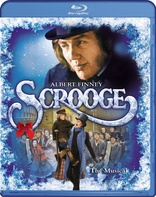
Movie rating
7.7 | / 10 |
Blu-ray rating
| Users | 4.8 | |
| Reviewer | 4.0 | |
| Overall | 4.0 |
Overview
Scrooge (1970)
In 1860, the stingy and cranky Ebenezer Scrooge that hates Christmas; loathes people and defends the decrease of the surplus of poor population runs his bank exploiting his employee Bob Cratchit and clients, giving a bitter treatment to his own nephew and acquaintances. However, in the Christmas Eve, he is visited by the doomed ghost of his former partner Jacob Marley that tells him that three spirits would visit him that night. The first one, the spirit of past Christmas, recalls his miserable youth when he lost his only love due to his greed; the spirit of the present Christmas shows him the poor situation of Bob's family and how joyful life may be; and the spirit of future Christmas shows his fate.
Starring: Albert Finney, Alec Guinness, Edith Evans, Kenneth More, Gordon JacksonDirector: Ronald Neame
| Family | Uncertain |
| Holiday | Uncertain |
| Musical | Uncertain |
| Drama | Uncertain |
| Fantasy | Uncertain |
Specifications
Video
Video codec: VC-1
Video resolution: 1080p
Aspect ratio: 2.35:1
Original aspect ratio: 2.35:1
Audio
English: DTS-HD Master Audio 5.1 (48kHz, 24-bit)
Spanish: DTS-HD Master Audio Mono
Subtitles
English SDH, Japanese, Spanish, Dutch
Discs
25GB Blu-ray Disc
Single disc (1 BD)
Playback
Region A, B (C untested)
Review
Rating summary
| Movie | 4.0 | |
| Video | 3.5 | |
| Audio | 4.5 | |
| Extras | 0.5 | |
| Overall | 4.0 |
Scrooge Blu-ray Movie Review
Sing 'A Christmas Carol.'
Reviewed by Jeffrey Kauffman October 1, 2011Did Leslie Bricusse single-handedly kill the film musical? For those of you who don’t recognize the name Leslie Bricusse, he is one of the most successful composer-lyricists of the 20th century and first came to prominence in a storied collaboration with actor-composer-lyricist Anthony Newley. Newley and Bricusse revolutionized the British musical in the early 1960’s with two massive hits, Stop the World—I Want to Get Off and The Roar of the Greasepaint, The Smell of the Crowd, both of which matriculated to the Great White Way with substantial success. It’s arguable that from a pop hit standpoint, Newley-Bricusse were the reigning champs of theatrical writers of their era, easily eclipsing better known teams like Kander and Ebb or Bock and Harnick just in sheer numbers of Hot 100 hits of their tunes. Those two Newley-Bricusse musicals alone provided a huge number of singles for various artists, songs that have since entered the lexicon of pop standards and many of which are still routinely performed today. “What Kind of Fool Am I?” “Who Can I Turn To?,” “Gonna Build a Mountain,” “A Wonderful Day Like Today,” “The Joker,” and “Once in a Lifetime” all came from those two shows. (Pop culture trivia moment: “Feeling Good,” the tune Jennifer Hudson is warbling in her melismatic sonic orgasm in those Weight Watchers commercials, is also a Newley-Bricusse gem from Greasepaint). Newley and Bricusse continued to collaborate, providing lyrics together for such phenomena as John Barry’s “Goldfinger,” as well as a wealth of other huge hits. But in the mid-sixties, Bricusse decided he wanted to prove himself as his own double (perhaps triple) threat, breaking away from Newley and increasingly working by himself. (He provided the lyric to another Bond theme, “You Only Live Twice,” by himself, not to mention a wealth of other mid- to late-sixties film themes, including the glorious pop tune culled from Jerry Goldsmith’s theme for The Sand Pebbles). In 1967, Bricusse’s first foray as composer-lyricist-scenarist, the lumbering Fox musical version of Doctor Dolittle with Rex Harrison, opened to largely disparaging reviews and disastrous box office returns. Two years later, Bricusse adapted another British literary classic, James Hilton’s Goodbye, Mr. Chips, once again providing music and lyrics (with none other than Terrence Ratigan writing the screenplay), a film which helped pound a few more nails into the coffin M-G-M had been constructing for itself. And just to make sure no one could accuse him of not at least attempting a trifecta, in 1970 Bricusse adapted perhaps the most iconic British literary endeavor of all time, Charles Dickens’ A Christmas Carol, this time providing all three functions—composing, lyric writing, screenplay authoring—once again.
The musical version, retitled (as so many adaptations of the source novella have been through the years) Scrooge, was easily the most successful of Bricusse’s three major film musicals of the era. While Doctor Dolittle had managed to cop a couple of handfuls of Oscar nominations (winning a Best Song statuette for Bricusse for “Talk to the Animals”) due to Fox’s more than a little desperate campaign to get the film a Best Picture nom (which in fact it did, against considerable odds), and Goodbye, Mr. Chips grabbed nominations for the stellar work of star Peter O’Toole and a perfunctory nomination for Bricusse’s song score and John Williams’ gorgeous orchestrations, both films had massively tanked at the box office, putting their respective studios in rather severe financial straits. Scrooge on the other hand was a rather substantial hit, though one that once again received critical brickbats for Bricusse’s score, balanced by glowing reviews for star Albert Finney’s incredible turn as Ebenezer Scrooge. (Scuttlebutt that year had Finney the early favorite to bring home a Best Actor Oscar for his performance, but he ended up not even garnering a nomination). In the intervening years, however, there have been two camps reassessing Bricusse’s contributions to the art of the film musical. One group decries Bricusse’s efforts as second rate stuff, often very glossy and beautifully produced, but lacking finesse and musical craft. Others find Bricusse’s approach rather substantially artful, moving the fusty movie musical genre gently forward by introducing such then unheard of ideas as sung interior monologues into the mix of what had largely been up to then a “stop the plot, let’s sing a song now” mode of making movie musicals.
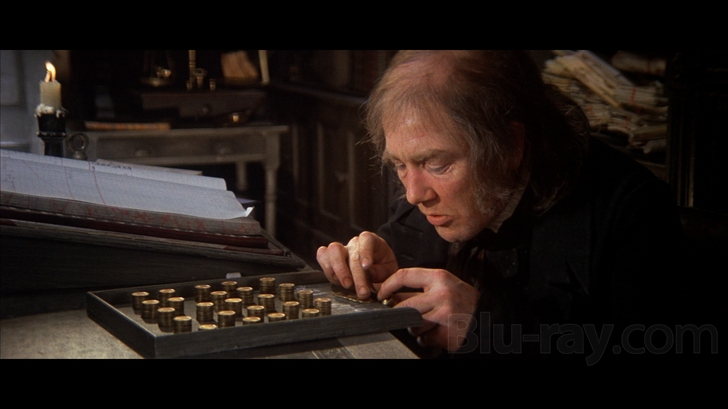
While I personally am not immune to some of Bricusse’s less than stellar lyric writing, I am more or less firmly in the second camp. Whatever faults individuals may find with any of these three films (and there are certainly faults to be found with all of them), Bricusse’s craft is firmly on display, with each score full of lovely melodies and at least occasionally some very artful lyric writing. There’s little doubt (in my mind at least) that Scrooge is inarguably the best of the three “big” Bricusse film musicals. Bricusse had introduced the idea of interior monologues being sung throughout Goodbye, Mr. Chips, and though he takes a somewhat large backward step into more traditional outright singing in Scrooge, he does something just as remarkable. Over and over again in this score, he crafts large sequences built out of various songs “colliding” with each other, and he also manages to do something rather close to a film musical version of opera’s recitative, more dialogue-like bridging sung material than the more standard 32 bar AABA material which is typically the stuff of Top 40 hits. Listen for example to three examples from Scrooge: early in the film, Bricusse merges “I Hate People,” Scrooge’s recitative-esque musing on his loathing for the human race, with the urchins’ disparaging “Father Christmas” aimed directly at Scrooge; later on, the haunting “You, You,” Scrooge’s lament for his lost love Isabel, is beautifully interwoven with Isabel’s own gorgeous “Happiness”; and at the film’s end, note how Bricusse blends a handful of the film’s song score into one long mostly sung medley which nonetheless manages to tie up all the loose plot ends, providing nice character beats not just for Scrooge but for many of the supporting characters as well. Bricusse, as he did with Harrison in Dolittle and O'Toole in Chips, is once again working here with an actor who is not a born singer, and he manages to write some extremely effective music within the confines of someone without a towering voice or expanded range.
The above is of course a more technical analysis of the film’s music, and most audiences, if they notice things like that at all, will do so subliminally. On the film’s surface is the absolutely stellar work of Finney as both the young and elderly Scrooge. It was a brilliant casting coup to nab Finney for the role at this stage of his career, and he does a formidable job at both ends of the age spectrum. Finney’s Scrooge is not the dastardly meanie that, say, Alistair Sim’s is. Instead we can see from virtually the first scene the wounded boy and the emotionally bankrupt young man in virtually every movement of the aged Scrooge. Also spectacular in this version of the iconic tale is Sir Alec Guinness, certainly one of the more spry ghosts of Jacob Marley ever on screen, one who manages to engender a few laughs out of his predicament (the moment where Scrooge asks Marley to sit still makes me laugh out loud after all of these years). Dame Edith Evans is an unusual female Ghost of Christmas Past (Dickens doesn’t specify a sex for the character), Kenneth More is a towering Ghost of Christmas Present, and a scary Paddy Stone (the film’s choreographer) is a nicely shrouded and mysterious Ghost of Christmas Future. David Collings is a beautifully cheerful Bob Cratchit and gets one of the score’s most haunting tunes, “Christmas Children,” and Anton Rodgers is an ebullient Tom Jenkins, a man deeply in debt to Scrooge who gets to sing the film’s best remembered (and Oscar nominated) production number “Thank You Very Much.” As I mentioned in my recent review of the 1935 Scrooge, while Richard Beaumont is a very appealing Tiny Tim, he has the one truly cringe-worthy song in the score, “The Beautiful Day.”
Part of what makes this Scrooge such a wonderfully affecting experience is the sure directorial hand of Ronald Neame. Neame’s pedigree stretches back to such legendary names as Powell-Pressburger and David Lean, and while he tends to overuse the then trendy zoom lenses a bit too much for my own particular taste, his Scrooge is a gorgeously wrought experience that doesn’t shirk from the dowdier elements of the time (look at how dirty Tom Jenkins’ broth pitcher is, or how filthy Scrooge’s own fingernails are in one close-up), but who also manages to invest the film with a certain old school glamour and gloss. (Neame's grandson Gareth is one of the guiding lights behind television's Downton Abbey). The production design is in fact one of the film’s strongest elements, though the tendency to make a London out of interlocking alleyways creates some problems for the film’s choreography, which often consists of large groups of people hopping around in unison. The film's one major fault, at least in some people's eyes, is the addition of a brief scene at the end which sees Scrooge visiting the bowels of Hell, welcomed there by Jacob Marley (a sequence routinely excised from broadcast versions of the film). It's not part of Dickens' conception, but it does provide Guinness with a few more epically hammy moments, if nothing else. Note to parents of young children: This segment, as well as Marley's sequence with spirits of the dead early in the film, may be too scary for tots.
As I mentioned in my review of both the 1935 Seymour Hicks version and last year’s review of the 1951 Alistair Sim version (which is due in a new transfer here any day, which I’ll be reviewing), most people opt for the Sim version when they settle down for a cozy winter’s viewing experience with Dickens’ immortal characters. I have always opted for this 1970 version, which offers an incredibly commanding lead performance by Finney, some fantastic supporting turns by a coterie of great British character actors, sumptuous production design and an often gorgeous score by Leslie Bricusse. Bricusse may have been unfairly lambasted back in the day when Scrooge and Bricusse’s other two mammoth film musicals were released, but if A Christmas Carol teaches us anything about life, it’s that second chances and redemption are always there, waiting for us. Hopefully a new generation will discover the joys of Scrooge now that it’s out on Blu-ray.
Scrooge Blu-ray Movie, Video Quality 
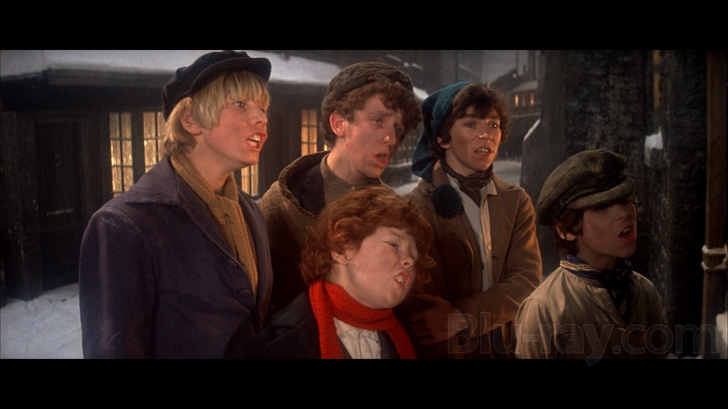
Scrooge is presented on Blu-ray with a VC-1 encoded 1080p transfer in 2.35:1. The good news is this is easily the best Scrooge has ever looked on home video. The image is considerably sharper and better defined now, with well saturated color and often excellent fine detail. Fleshtones still tend to be skewed somewhat toward the yellow side of things, at least some of the time (especially in the early sequences), and crush is still fairly evident in many of the dimly lit scenes, especially in the dark streets of London and Scrooge's sparsely illuminated mansion. All of the special effects with young and old Scrooge side by side were obviously opticals done with double printing and therefore grain is noticeably more apparent. There is also occasional flicker throughout the film, but it's not overly debilitating. The print is virtually damage free, though there was one fairly noticeable scratch (probably less than a second) and couple of white flecks marring the image. Overall, though, things are suitably sharp and very well defined, with grain intact and a very filmic look to this presentation.
Scrooge Blu-ray Movie, Audio Quality 
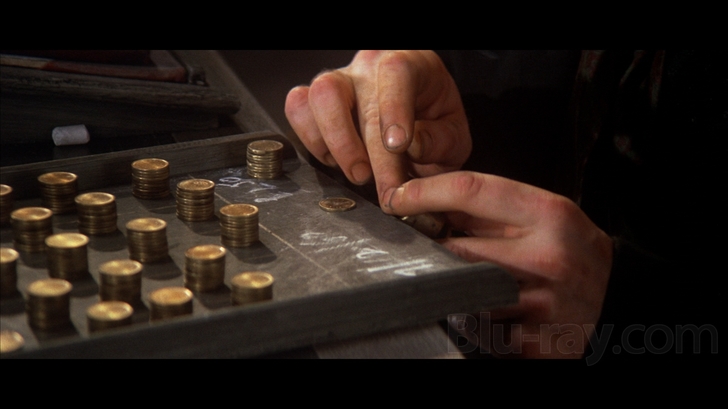
Scrooge, much like another late-sixties British film musical, Oliver!, always suffered from a strangely "cramped" sounding audio mix, and the good news is that somewhat muffled sound is completely gone from this glorious new lossless DTS-HD Master Audio 5.1 mix. Bricusse utilizes a large amount of antiphonal singing throughout his score to Scrooge, and the separation of soloists and even choirs who are singing "against" each other is very artfully rendered on the 5.1 track. Best of all are Ian Fraser's beautiful orchestrations, which evoke Christmas with lots of colorful effects like glockenspiels and bells. Dynamic range is also very, very good, capturing everything from Scrooge's remorseful whispers as he begins to regret his life decisions to the thundering sounds of church chimes which nearly deafen the unbelieving Scrooge when Marley is about to make his entrance. The surround channels are very well utilized for the score, and occasionally for other effects as well (listen to the nice panning effect when the apparition of the funeral cortege occurs early in the film). Dialogue is crisp and clear, and the entire mix is extremely well prioritized.
Update: There has been some consternation about what constitutes an Overture for Scrooge. As a longtime fan of the film I am well aware that the film initially had an Overture, an orchestral prelude featuring a medley of the film's songs, which was included on the Original Soundtrack LP and the previous DVD release. However, my particular DVD of this film had a "Play Film With Overture" option which simply started the film from the credits, with the choral underscore of "A Christmas Carol." After repeatedly trying this option, I determined my DVD has an authoring error, and approximately every third time or so it actually does go to the "Overture," otherwise it starts with the film's beginning credits. The Blu-ray does not contain the Overture in any way, shape or form. The Blu-ray also features the Exit Music, an orchestral reprise of "Thank You Very Much."
Scrooge Blu-ray Movie, Special Features and Extras 
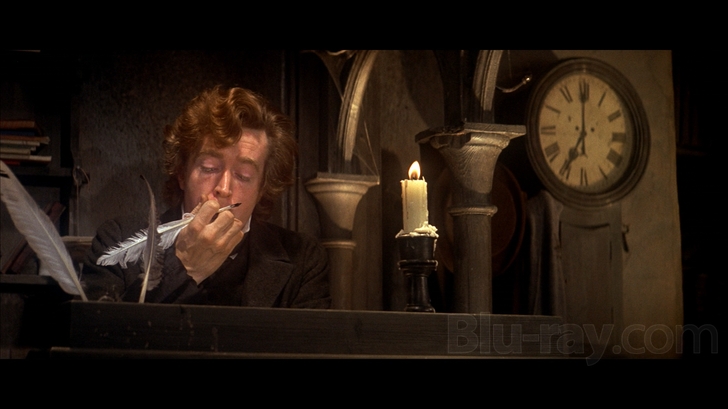
Theatrical Trailer (HD; 3:25)
Scrooge Blu-ray Movie, Overall Score and Recommendation 
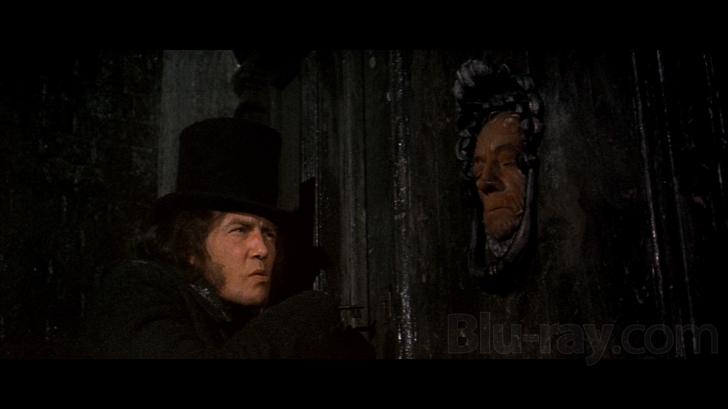
Leslie Bricusse was probably laughing all the way to the bank even as various critics were taking him to task for supposedly ruining various iconic literary masterpieces with ostensibly misbegotten musical adaptations. Time may not have been entirely kind to Bricusse (who nonetheless continued to write film and stage musicals, even reteaming with Newley for Willy Wonka and the Chocolate Factory, as well as retooling Scrooge for the stage), but from the vantage point now of several decades, all three of his big film musicals have at least a few things to recommend them. In the case of Scrooge, there are certainly more than a few things, including Finney's incomparable performance as the title character. Even those who don't normally like film musicals may find themselves enchanted with this particular adaptation, which looks very good and sounds great on Blu-ray. Highly recommended.
Similar titles
Similar titles you might also like

A Christmas Carol
1984

The Muppet Christmas Carol
1992

The Nutcracker
1993

A Christmas Carol
1951

A Christmas Carol
1938

Scrooge
1935

Mary Poppins
50th Anniversary Edition
1964

Bedknobs and Broomsticks
Special Edition
1971

Newsies
20th Anniversary Edition
1992

The Nutcracker: The Untold Story
2010

Willy Wonka & the Chocolate Factory 4K
1971

The Nightmare Before Christmas
Disney100
1993

Mary Poppins Returns
2018

The Little Prince
1974

The Wiz
1978

Beauty and the Beast
2017

Pete's Dragon
35th Anniversary Edition
1977

Miracle on 34th Street
1994

Prancer
1989

Cirque du Soleil: Journey of Man 3D
2000